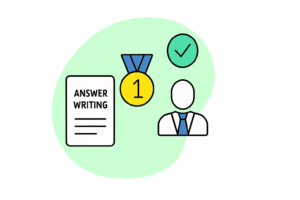Aspiring to become a judge is a noble and rewarding goal, but it’s not without its challenges. The long hours of studying, complex legal concepts, and high expectations can be overwhelming. The pressure can impact your mental health, relationships, and overall well-being, making it essential to find a balance.
While your books and studies may take center stage, it’s important to remember that you have a life beyond the study table. Let’s explore how you can succeed both academically and personally.
Why Is Work-Life Balance So Important?

1. Avoid Burnout
Solely focusing on preparation without downtime can lead to mental and emotional exhaustion. Burnout zaps your energy and motivation; two things you cannot afford to lose as a judiciary aspirant.
2. Maintain Mental & Emotional Well-Being
Taking time for yourself keeps stress levels down and morale high. A sound mind helps you focus better, retain information, and stay consistent.
3. Enhance Your Overall Performance
Short breaks, meaningful conversations, and leisure activities recharge your brain, improving comprehension and memory retention during study hours.
4. Develop Well-Rounded Skills
Activities outside the law books help you grow personally. You build time management, interpersonal communication, and emotional intelligence; skills essential for a future judge.
5. Create a Sustainable Routine
A balanced routine is a long-term routine. You avoid burnout, stay productive, and feel more in control of your journey.
Tips & Strategies to Balance Study with Life
Crafted with love and backed by Edzorb Law’s extensive research, these strategies are practical, realistic, and totally doable.
1. Set Realistic Goals & Priorities
Break your syllabus into digestible chunks. Don’t aim to master everything at once. Prioritize based on urgency, e.g., focus more on revising close to mock tests.
Progress, not perfection, is your winning mindset.
2. Master the Art of Time Management
Use planners or to-do lists to block time for:
- Studying
- Breaks
- Exercise
- Family/Friends
Batch similar tasks (e.g., Criminal Law revision + practice questions on the same day). Avoid multitasking; it kills focus.
3. Take Breaks & Rejuvenate
Breaks are not a luxury, they’re a necessity.
Step outside. Meditate. Listen to music. Indulge in hobbies like painting, gardening, or writing. They reset your mind and unlock fresh creativity and clarity.
4. Stay Connected with Loved Ones
Your circle is your support system. Talk to them. Let them know:
- When you need silence
- When you can hang out
- When you just need to vent
Open communication reduces misunderstandings and strengthens bonds.
5. Take Care of Your Body & Mind
- Eat nourishing meals
- Stay active
- Sleep well
- Avoid harmful habits
And most importantly, seek help if you feel overwhelmed. Therapy, meditation apps, or journaling can work wonders.
6. Make Time for Your Hobby

Your hobby is your happy place. It relieves stress, boosts creativity, and often brings new perspectives.
Reading fiction, writing poetry, tending plants, or dancing, it all counts.
We encourages aspirants to nurture their interests alongside studies.
Final Thoughts
Balancing judicial preparation and personal life isn’t a myth, it’s a mindset.
With the right structure, support, and self-awareness, you can study smarter, stay healthier, and live more meaningfully.
Remember, success isn’t just about clearing exams; it’s about who you become in the process.
Power Your Prep with Edzorb Law
The ultimate companion for judiciary aspirants.
- Daily Case Capsules
- MCQs
- Mind Maps
- Prep Strategy Modules
- Smart Notes
🎯 Holistic prep for a well-balanced you.
Download the Edzorb Law App

 Podcast
Podcast








 Features
Features






